ABC Garden:
ABC Science Stations
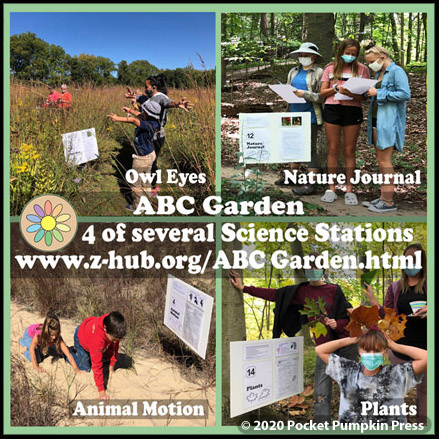
ABC Art Studios

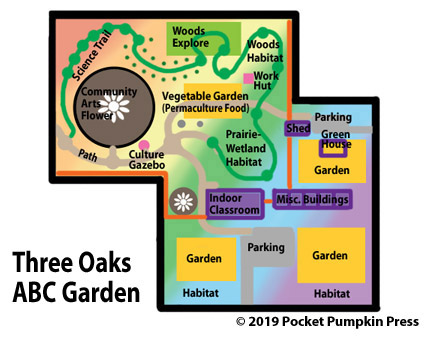
Three Oaks, Michigan.
Click to see Maps and Plans for ABC Garden.
If you want to JOIN in on
building or visiting the ABC Garden
contact Zoe at z.hub.garden@gmail.com
See ABC Garden on Facebook
See ABC Garden at Pinterest
Contact Zoe Elrick z.hub.garden@gmail.com for
speaking, consulting, ABC education lessons,
and outdoor classroom design, on the
ABC Garden and the ABCs of Community Education.
Why build and use an ABC Garden?
Answer: Build and use an ABC Garden for many,
many reasons, including the following.
1.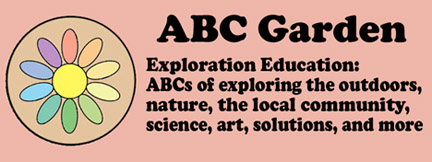
to boost fun and joy in education
to boost science and art
For Detailed Explanations:
click on graphic
or see explanations below.
2.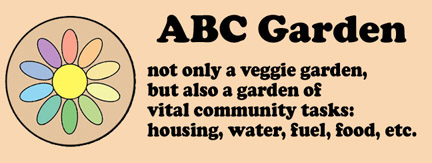
to support community vitality
3.
to promote community cooperation
to end poverty
4.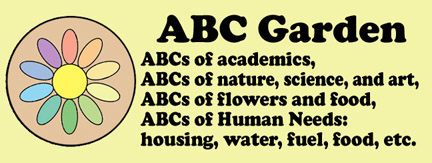
to improve the economy and more
5.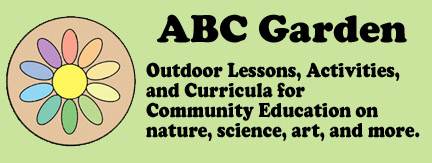
to improve education
6.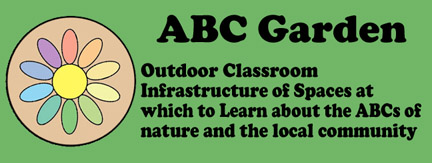
to improve education
7.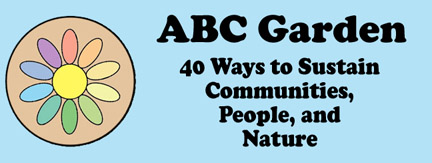
to support health of both people and nature
8.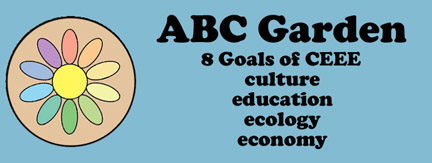
to foster a sustainable community system of
culture, education, ecology, and economy
9.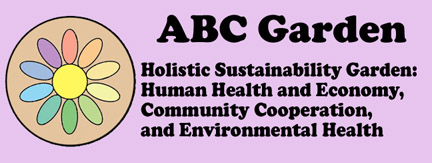
to support health of both people and nature
10.
to help the land, nature, society,
community cooperation, education,
economy, democracy, equity, and more.
Detailed Explanations

1.) Exploration is fun, wise, healthy, and important. An ABC Garden helps each school to get their students outdoors to explore, to have fun, and to be healthy and wise. As students have an adventure and explore in the ABC Garden, students learn hands-on about the world and their community.
The ABC Garden is an Exploration Garden, an Experiential Garden, and an Adventure Garden for Exploration Education,
Experiential Education,
Adventure Education,
Outdoor Education,
Nature Education,
Community Education,
Science and Art Education,
Poverty-Reduction Education,
and more!
● The ABC Garden entails the construction of a landscape architecture design of a specific outdoor classroom infrastructure. Once built, the ABC Garden outdoor classrooms are set for classes to use them with curricula and lessons, which are custom-designed for the ABC Garden.
● The ABC Garden is a Science Garden and an Art Garden, at which students explore the outdoors, nature, and their community, by doing a wide variety of science and art projects. At the ABC Garden, students study the science and art of community. Students do science and art projects to study the community's strengths and unique features. Plus, students do science and art projects to help to solve and diminish each chronic problem (poverty, corporate corruption, unemployment, malnourishment, pollution, habitat loss, and more), in the community and beyond.
● The ABC Garden is a connection garden: it connects students to the local outdoors, nature, and community.
● 21st-century schools are looking for a balance between hands-on activities, paper activities, and electronic activities. The ABC Garden is a hands-on garden, which helps students to physically connect in-person to the geographic community, instead of having only electronic connections through the internet or paper connections, at a desk, inside a school building.
● The ABC Garden is a school's nature center, at which students explore how nature relates to themselves and to their community, as well as to human needs, to jobs, and to the economy. The ABC Gardens provides a space of many features to explore to learn about local nature and the local community. Students will explore the strengths of their community and the delightful natural features of local habitats. Plus, students will explore community needs and problems, as well as explore and use science, art, civics, and community cooperation to help to meet community needs and to solve problems. The ABC Garden is a community solution garden.
A few of many reasons for an ABC Garden ...
to boost joy and fun in life and education,
to promote beauty and vitality in community,
to foster community cooperation,
to create jobs and to end poverty,
to establish a continuum from school to jobs,
to improve education,
to promote science and art in education,
to expand people's awareness of nature,
to promote history of society's sustainability,
to promote sustainable science, art, and history,
to promote ecology and a sustainable economy,
to bolster clean air, clean water, fertile soil,
to support local food,
to support local nature and ecology,
to support the local economy and local jobs,
and more.

2.) The ABC Garden is not only a vegetable garden, but also a garden of human needs and vital community tasks: housing, utilities, water, fuel, food, sanitation, land stewardship, local small businesses, and more. At the ABC Garden, students learn how to run a community and to do vital community tasks. The ABC Garden is a Vital Community Tasks Garden.
● The ABC Garden is not only a vegetable garden, not only a vital community tasks garden, but also a nature exploration garden, an education garden, a science garden, an art garden, and has many, many purposes and uses, including those mentioned above and below.
● The ABC Garden entails the construction of a specific infrastructure of outdoor classrooms of stations for science, art, and community task; once built, the ABC Garden outdoor classrooms are set for classes to use them with curricula and lessons, which are custom-designed for the ABC Garden.

3.) The ABC Garden helps schools accomplish HANDY Education, which Helps All Neighbors Do well and prosper, including to meet all their human needs. The ABC Garden is the Yard in which students learn how to help their neighbors and the community.Students learn how to work with and to help their fellow classmates as well as other people in the community. Kids are full of energy. They love to wiggle and to be active. Plus, kids love to help. Let's provide students with an ABC Garden and a HANDY Education that gets kids outdoors to wiggle, to be active, and to help their community.
● HANDY Education is not only about academics, but also about human needs and vital community skills: housing, water, fuel, food, sanitation, land stewardship, local job creation, local small businesses, and more, as well as how to diminish poverty.
The ABC Garden is a HANDY schoolyard,
a Human Needs Garden, and
a Poverty-Reduction Garden.
● The ABC Garden entails the construction of a specific infrastructure of outdoor classrooms of stations for science, art, and community tasks; once built, the ABC Garden outdoor classrooms are set for classes to use them with curricula and lessons, which are custom-designed for the ABC Garden.
● In the 21st-century, many government officials, schools, teachers, and parents want to support an unselfish education, altruistic education, cooperation education, and community education — HANDY Education: Help All Neighbors Do well Yard. Many government officials, schools, teachers, parents, and students are tired of the rat race education obsessions of academics, state standardized academic testing, and hyper-competition, while ignoring the needs and the problems of people, communities, and the world. Problems include poverty, junk food, pollution, habitat loss, unemployment, and corporate corruption. An ABC Garden helps each school to provide students with a HANDY Education, in which students learn not only academics but also how to cooperate with the community to meet human needs, to do vital community skills (housing, water, fuel, food, sanitation, land stewardship, and more), and to solve problems in the local community, and beyond. The ABC Garden is a HANDY schoolyard,
a Human Needs Garden, and
a Poverty-Reduction Garden.
● The ABC Garden is a community solution garden. HANDY Education is an education that has students not only gather data and make formal reports, but also has students solve real problems (poverty, pollution, etc.) in the community. HANDY Education does not just have kids donate time and money to a charity, but HANDY Education is an education that changes the economy to reform the economy into sustainable local economies that decreases poverty. 20th-century schooling trained kids to fit into capitalism, an economy of increasing poverty, corporate corruption, economic disparity, and environmental degradation. 21st-century schooling of HANDY Education with the ABC Garden aims to help to change the economy for the better to become sustainable, to decrease poverty, unemployment, corporate corruption, and economic disparity, as well as to help people and nature to live together and to thrive together. The ABC Garden with its HANDY Education helps the community to support basic human needs, utilities, vital community tasks, neighborly relationships, community cooperation, business, jobs, and land stewardship.

4.) Start Small and Simple;
later, year after year, gradually get Bigger and more Complex.
Do this not only for academics;
but also, for learning about nature, science, art, running a community, ecology, economy, human needs, vital community tasks, technology, and more.
● The ABCs mean the first early steps (steps 1-2-3) of learning something. The ABCs of academics includes learning the alphabet, reading 3-letter words, counting from 1 to 20, and adding 1-digit numbers. Following, schoolyear after schoolyear, students were taught larger and more complex language and math skills. Yet, no matter how advanced students are, students never forget the ABCs and 1-2-3s of academics. Students cannot read a chapter book, if they can't read 3-letter words. Students cannot do fractions and algebra, if they cannot count from 1 to 20. In order to properly and effectively do complex things, we must learn how to do things simply, first.
● In 20th-century schooling, students learned the ABCs of only academics (reading, writing, and math). With the ABC Garden and corresponding curricula and lessons, in 21st-century schooling, students can learn the ABCs of not only academics, but also of nature, science, art, running a community, economy, history, human needs, vital community tasks (housing, water fuel, food, sanitation, land stewardship, etc.), solving problems in the community, and more. The ABC Garden entails the construction of a specific infrastructure of outdoor classrooms of stations for science, art, and community tasks; once built, the ABC Garden outdoor classrooms are ready for classes to use them with curricula and lessons, which are custom-designed for the ABC Garden. Learning about running a community includes learning about the ABCs of nature, the science and art of community, history of communities, ecology, economy, human needs, vital community tasks (housing, water, fuel, food, etc.), and more.
● Since the 20th-century, in general, in the USA, children have been born and raised in a very big and complex society. In general, in the USA, in 20th-century schooling, modern children were never taught how to run a simple, small community. Never having learned how to run simple, small communities, many adults ineptly ran large cities, states, nations, governments, businesses, and economies, in general, in the 20th-century, USA. Following, many problems worsened, including poverty, corporate corruption, government corruption, pollution, and environmental degradation.
● The ABC Garden and its corresponding curricula and lessons provide students with the setting and opportunity to learn how to run a simple, small community. Plus, school year after school year, the ABC Garden provides a venue for more complex community skills. Furthermore, students link tasks from the ABC Garden to the surrounding community, to learn larger and more complex ways to run a community. As children, students can start to actively help to solve problems in their community. Children shouldn't need to wait to grow up first. As children, students can actively help to diminish poverty, for real, in their community and beyond, instead of just sit in a school building and ignore problems in the community and around the globe.
● People cannot do algebra if they have not learned how to count from 1 to 20. Likewise, people cannot harmoniously run a complex large society, if they have not learned how to harmoniously run a simple small community. Getting an education on how to run a simple, small community helps people to understand how to better run larger and more complex communities, cities, states, nations, governments, businesses, and economies.
Read more about School and ABCs of Education.

5.) An ABC Garden includes outdoor lessons, activities, and curricula that goes with the outdoor classroom infrastructure. Students learn interdisciplinary lessons about nature, science, art, ecology, economy, community, history, and more.

6.) An ABC Garden is a landscape architecture design and infrastructure of outdoor classrooms. In general, people and students will more likely do nature and community stewardship activities, if spaces are built for those specific activities. An ABC Garden is a space for a variety of educational purposes, lessons, and activities, including the specific activities and lessons of nature and community stewardship.
● An ABC Garden is an infrastructure of outdoor classrooms, at which students learn how to run a community — a community's basic functions, utilities, government, and fair economy. The ABC Garden is not only a vegetable garden, but also a garden of vital basic community tasks (energy, water management, local food, utilities, sanitation, local jobs, local wealth and investing, land stewardship, etc.). Once built, the ABC Garden outdoor classrooms are set for classes to use them with curricula and lessons, which are custom-designed for the ABC Garden.
● An ABC Garden can be at a school, a college, a preschool, a community center, a nature center, a science and art center, etc. Plus, ideally, a school and ABC Garden should be at or near the core and center of every community, such as at a community's geographic center, cultural hub, economic hub, and or utilities hub. An ABC Garden is the central infrastructure of basic human needs, utilities, vital community tasks, neighborly relationships, community cooperation, business, jobs, and land stewardship. At the center of every community, there should be a school and ABC Garden, which exhibits core community functions (vital community tasks: housing, water, fuel, food, sanitation, land stewardship, jobs, local small businesses, etc.) and is a functional space for students to learn how to run a simple, small community, as well as to actually run a simple, small community. Students learn simple, small ways and more complicated ways to run a community and provide utilities at the ABC Garden as well as link to the larger complex infrastructure of utilities within the surrounding community. The ABC Garden ties into the surrounding community and helps to serve the surrounding community.
● The ABC Garden provides a visual-spatial tool for teaching about the basic tasks of a community. The ABC Garden is not only a visual-spatial design to exhibit important community tasks, but also it is a functional structure that students use to actively run a small community. The ABC Garden is for active use as well as to provide a space to exhibit important things, such as the important community tasks, that no person can live without. It's important to build spaces for important things. The ABC Garden is a Garden of Important Things, and a garden of students helping to grow, sustain, and enrich those important things.
● In the 21st-century, the ABC Garden provides spaces to do community tasks to jump start, sustain, and enrich a community. These community task spaces were lacking, in the USA, in the 20th-century. In the 20th-century, the USA had many spaces specifically for academics, sports, driving, music, fine arts, TVs, computers, and national and international chain stores; hence, in the 20th-century, children and adults mainly learned about and partook of the activities related to academics, sports, driving, music, fine arts, TVs, computers, and shopping at national and international chain stores. During the 20th-century, while community sports may have prospered, community cohesion faded in vital community functions such as in local food, local small businesses, local banking, local investing, and stewarding the community landscape (including vacant lots, natural habitats, air quality, soil fertility, rivers, water sources, etc.). Letting community cohesion fade led to many social, economic, and environmental problems. In the 21st-century, let's build community task spaces, such as the task spaces of the ABC Garden, to encourage children and adults to learn and do community cooperation and community tasks, as well as to solve and diminish many social, economic, and environmental problems, in the local community and beyond. The ABC Garden is a major help to communities and a major action in diminishing global problems, including poverty, corporate corruption, pollution, and severe climate change.
● The ABC Garden makes utilities available to students in simple, small, safe ways. For instance, students begin engaging with sanitation and fuel in a small, simple, hands-on, basic ways, such as with composting food bins, composting toilets, campfires, and solar panels. Large structures for utilities (a water tower, a sewage treatment plant, a power station or substation, etc.) are too big, ugly, and or dangerous to be near a school. The large structures will stay at the edges of towns and cities. Yet, currently, the smaller features of utilities are hidden and run right through the heart of schools, towns, and cities. The ABC Garden exposes and exhibits some of the smaller, simpler, more beautiful, and safer components of utilities. The ABC Garden makes utilities available to students in safe ways, so students can interact with them and learn.

7.) An ABC Garden helps the community and students to be sustainable in many ways, including actions that support the 40 sustainability categories:
The ABC Garden hits all 40 categories. By building and using an ABC Garden with its corresponding lessons, the community and students take action to support all 40 sustainability categories.
1. Peace: Morals-Love-Awareness-Health-Safety
2. Pursuits: You, Your Unselfish Self
3. Planet: Nature, Near and Far, Big and Small
4. People: Family, Friends, etc.
5. Palleee: Functional Community
6. Probing: Community Education
7. Parks and Pastures: Local Ecology
8. No-Poverty: Plush Local Economies
9. Plait: Holistic: Sci-Art-Eco-Eco
10. Protection: Sustainability
11. Plaza: Education Space: ABC Garden
12. Play and Fun: Outdoor Time
13. Perspective: Stories of Peace
14. Partners: Cooperation, Democracy
15. Pep: Eight Health Categories: moral, mental, physical, economic (having enough stuff), environmental (clean air, clean water, etc.), social (community),
fun, and disease treatment and healing.
16. Profits-Local: Small Businesses
17. Eco: Ecology-Economy
18. Land: Holistic Landcare
19. Scales: of Economy and Government
20. Ask: Question Everything
21. Visions: History and Future of Sustainability
22. Native: Indigenous Cultures
23. Low-Tech: Sustainable Technology
24. High-Tech: Sustainable Technology
25. Public: Government Policy
26. Personal: Actions, Homesteading, etc.
27. Biz: Your Own Local Small Business
28. Local: Shopping, Food, Working, etc.
29. Food: Local, Organic, non-GMO, Crop Diversity,
Family Farms, Community Co-op Farms,
Permaculture, Managed Grazing, No-Till Farming, etc.
30. Energy: Fuel, Electric Power, Renewable Energy, etc.
31. Clubs: Environmental
32. Climate: Mitigate Change
33.
Muck: Litter, Garbage, Pollution
34.
Elements: Air, Water, Soil
35. RRR: Reduce, Reuse, Recycle
36. Design: and Land Management
37. Wilderness: Conservation
38.
Care: Natural Resource Management
39.
Construct: Sustainable Building
40. Planning: Large-Scale Land Use, Watersheds
See details at
40 Sustainability Categories
(a. k. a. 40 Ways to Sustain People, Nature,
the Economy, and Local Communities)


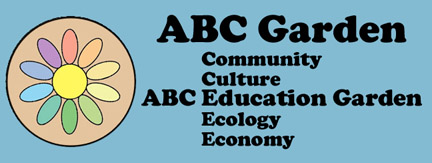
8.) An ABC Garden is a Community's EEE Garden:
a Education-Ecology-Economy System Garden.
At an ABC Garden, students learn about how culture, education, ecology, and the economy relate to each other within a community. A culture is a way of life and how people live, learn, and work relates to the local ecology, nature, and the global environment. At the ABC Garden, students learn how set up, uphold, and enrich a community that has a sustainable culture that includes a sustainable education and sustainable economy. Students learn how to run a local economy that uses nature, while it also sustains and enriches nature. With an ABC Garden, a community's sustainable school ushers graduates into eco jobs, which benefit both the ecology and the economy, locally and globally. Graduates earn a decent living, plus help the environment and community too. By establishing an ABC Garden with EEE System lessons, communities and students can help to diminish many social, economic, and environmental problems, locally and worldwide.
● The best way to help, sustain, and enrich people, nature, and a community is to improve a community's culture, education, ecology, and economy in unison. Cultural, educational, ecologic, and economic actions should help each other to achieve the same goals of helping students and the community to be healthy and to diminish poverty. A community's culture, education, ecology, and economy should have the same goals to help people, nature, the local community, and beyond. Every community should establish its own sustainable education goals and sustainable educaiton standards, including the following 10 Joint Goals. It is encouraged that schools pursue the 10 goals to pursue to boost education, ecology, the economy, and to enrich the community's culture. It is encouraged that schools, and agencies in governments, businesses, the economy, peace, culture, and more pursuit the 10 Joint Goals of GREEEPCH:
1. Peace: Morals, Ethics, Neighborly Love:
Morals-Love-Awareness-Health-Safety
A peaceful and moral society, community, agency, and person are good by being loving and caring for communities, people, and nature.
To lovingly care for communities, people, and nature, a society, community, agency, and people must be aware of communities, people, and nature and their needs for health and safety.
2. Protection: Sustainability.
Understand Sustainability.
We want to sustain people.
Yet in order to sustain people,
we must also
sustain nature, a favorable climate, local ecologies,
palleee: functional local communities with their EEE systems, local economies, community education,
and the the 40 Sustainability Categories.
Plus, various agencies must have the same top 10 goals which are the "10 joint goals."
3. Plaza: Education Space: ABC Garden.
At the ABC Garden, students learn the ABCs of community education, running a community, working on the 40 Sustainability Categories, and working on the other 9 Joint Goals of GREEEPCH.
4. Play and Fun: Outdoor Time.
5. No-Poverty: Plush Local Economies.
6. Palleee: Functional Community with EEE System.
7. Probing: Community Education.
8. Parks and Pastures: Local Ecology,
Community Landscape, Local Nature, Farmland.
9. Plait: Holistic: Sci-Art-Eco-Eco,
Science, Art, Ecology, Economy Link Together.
10. Energy.
Details of the 10 goals are at
10 Joint Goals of GREEEPCH:
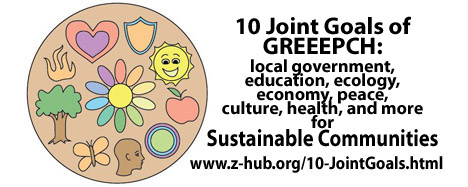

9.) An ABC Garden is a Holistic Garden in that it relates not just to one concern or topic, but to every major human concern and topic, including health, safety, culture, education, ecology, economy, jobs, business, academics, history, science, art, community, government, justice, environment, sustainability, community cooperation, peace, and fun.
● An ABC Garden is an Interdisciplinary Garden in that it relates not just to one school subject or field of study but to many subjects and fields, including health, safety, culture, education, ecology, economy, jobs, business, academics, history, science, art, community, government, justice, environment, sustainability, community cooperation, peace, and fun.
● The ABC Garden is a Sustainability Garden
in that it helps to sustain and enrich
communities, people, and nature.
● The ABC Garden is a Holistic Sustainability Garden because it helps to sustain and enrich many major human concerns, including health, safety, culture, education, ecology, economy, jobs, business, academics, science, art, communities, government, justice, environment, community cooperation, peace, and fun. The ABC Garden helps to improve businesses and the quality of jobs by helping to make businesses better for communities, people, and nature. At an ABC Garden, as students learn about how to take care of community needs, human needs, and nature's needs, students learn how to help to sustain and enrich many major human concerns and to solve and diminish many problems (social, economic, environmental, education, health), in the community and beyond.
● The ABC Garden is a Holistic Health Garden because it helps support people's 7 areas of health: moral health, mental health, physical fitness, community-social health, environmental health, and disease treatment.

10.) An ABC Garden is a land design innovation, an infrastructure innovation, a social innovation, a civic innovation, an education innovation, and an economic innovation. The ABC Garden is a design, an innovation, an invention. An ABC Garden is a landscape architecture design of outdoor classrooms with curricula designed for classes at the ABC Garden. An ABC Garden with its corresponding curricula provides a complete education and the best type of education, which includes learning about the local land, the local community, and the local economy of vital community tasks. The ABC Garden is a land design of outdoor classrooms, at which students learn how to gather, grow, make, and distribute stuff, while also sustaining the land and nature.
● Land Design Innovation.
Education Innovation.
An ABC Garden is an education design, which integrates together a land design with customed-designed curricula. The ABC Garden supports land-based, place-based, nature-based education. The ABC Garden unites the land and education together. At the ABC Garden, students learn about the local land, local geography, local nature and ecology, and more. At the ABC Garden, academic lessons (reading, writing, etc.) relate to the land and nature, and non-academic lessons (art, nutrition, etc.) relate to the land and nature.
● Social, Civic, Economic Innovation.
Plus, the ABC Garden supports community-based, local-economy-based education. The ABC Garden unites the community, economy, and education together. An ABC Garden is a social, civic, and economic innovation to help a whole community to boost health and community cooperation, and to reduce poverty. An ABC Garden is a social, civic, economic, and education innovation to help students learn how to boost health and community cooperation, and to reduce poverty. The ABC Garden helps the community and students to help the whole community, community jobs, and many local small businesses in the community, and to aid the establishment of more local small businesses as needed. The ABC Garden helps students to learn how to run a functional community, which entails the community cooperation of doing vital community tasks to make and distribute vital stuff (housing, water, fuel, food, jobs, etc.) to everyone in the community to prevent poverty and to reduce poverty. The vital community tasks are an important part of the local economy. As students practice doing vital community tasks, students are learning about the local economy. At the ABC Garden, students learn about the community and its local economy. At the ABC Garden, students learn the ABCs of running a functional community (and local economy) that makes and distributes vital stuff to everyone — first, among the students and gradually among more people within the surrounding community. At the ABC Garden, students learn how to make vital stuff in the most simplistic ways, first. Later, at the ABC Garden and beyond, students learn how to make and distribute vital stuff in more advanced ways.
● Land Design, Social, Civic, Economic, and Education Innovation United.
The larger view is that the ABC Garden supports land-based, place-based, nature-based, local-economy-based, community-based education. The ABC Garden unites the land, community, economy, and education together. Indeed, the ABC Garden is a land-social-civic-economic-education innovation. At the ABC Garden, students learn that, in reality, a community and its economy are based on the land and nature. The community and economy include water and food. The water, that we drink, and the soil, in which we grow food, come from nature. An economic education includes learning how our materials for vital stuff (housing, water, food, etc.) comes from nature and the land. A full economic education includes learning how to gather and grow stuff from the nature and the land, while also sustaining nature and the land. Education, especially an economic education, must be connected to the land and nature. To escape from poverty and or to avoid poverty, plus to help others escape from or avoid poverty, children must get an education that relates to the land and nature. Students learn how to run a community and to reduce poverty by getting a full economic education, in which students learn how to wisely use and sustain nature. No childhood education is complete unless children learn how to wisely use nature and how to sustain nature. Plus, poverty will never go away, unless we involve children in helping to reduce poverty, by teaching children how to wisely use and sustain nature. At the ABC Garden, students gain a full economic education, including to support local businesses and jobs and to diminish poverty. At the ABC Garden, students learn how to run a functional community of cooperation to do vital community tasks to make and distribute vital stuff (housing, water, food, jobs, etc.) to everyone in the community. The ABC Garden connects the land, nature, community, economy, and education together. The ABC Garden is a land design of outdoor classrooms, at which students learn how to gather, grow, make, and distribute stuff, while also sustaining the land and nature.
Also, 50+ more benefits of ABC Garden.
www.z-hub.org/ABCbenefits.html
ABC Garden benefits and the many lessons
that students learn, in the ABC Garden.
Also, the following information on this page are explanations and information about the concepts and goals of the ABC Holistic Education Garden design and lessons learned in the garden.
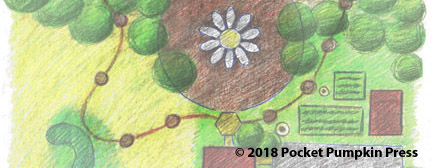
z-hub z-design. Holistic Design.
Landscape Architecture. Holistic Design plans and designs the land and outdoor spaces to help people and students of all ages to learn and practice (knowledge and experience) how to help communities, people, and nature through culture, education, ecology, economy, health, science, art, language, social studies, and more. Holistic Design can be implemented at schools, community centers, camps, nature centers, education campuses, commercial centers, residential and homestead sites, and elsewhere.
Read more about z-design and holistic design.

ABCs of Education.
Start Simple and Small;
later, gradually get more Complex and Bigger.
Do this not only for academics;
but also, for community, ecology, economy, and technology, and more.
The ABC Holistic Education Garden includes the construction of specific outdoor classrooms; once built, the outdoor classrooms are set for classes to use them for ABC Holistic Education curricula and lessons. Holistic means Whole-Culture.
The ABCs mean the first early steps (steps 1, 2, 3) of learning something. The ABCs of academics includes learning the alphabet, reading 3-letter words, counting from 1 to 20, and adding 1-digit numbers. In modern pop culture (in school and out of school), children typically learn about community, economy, technology, etc. by starting at about step 38 or 58, including watching a community parade, adding coins and dollar bills, turning on a faucet to get water, and using a new computer or maybe even a 50-year-old typewriter. In the ABC Holistic Education Garden, students learn the ABCs of community, ecology, economy, technology, etc. including how to build and run a simple small community and handmake simple basic stuff (shelter, water, food, clothes, soap, simple tools, etc.) for a community. People cannot do algebra if they have not learned how to count from 1 to 20. Likewise, people cannot harmoniously run a complex large society, if they have not learned how to harmoniously run a simple small community.
Read more about School and ABCs of Education.
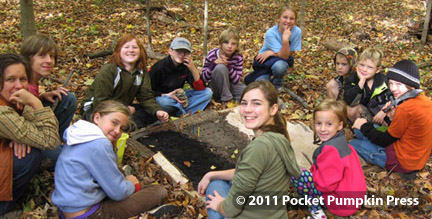
Outdoor Education.
The great outdoors is 3-dimensional, bumpy, and spatially vast for 100s of feet in many directions. The great outdoors is not a mere 8.5" x 11" flat sheet of paper or 24" x 36" flat computer screen. Paper and computers have their uses in education, and so does the bumpy vast outdoors. The great outdoors is part of the community. To be outdoors is to connect with the community. To the contrary, spending too long indoors or on electronics isolates us from the community. The ABC Garden is outdoor education that helps kids to engage with the community in relation to the community's plants, animals, habitats, science, art, housing, water, food, landcare, community skills, and more.
Read more at Outdoor Education.
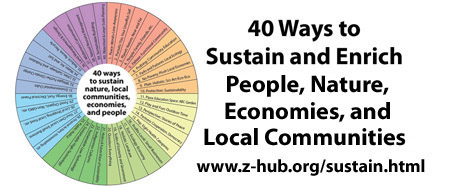

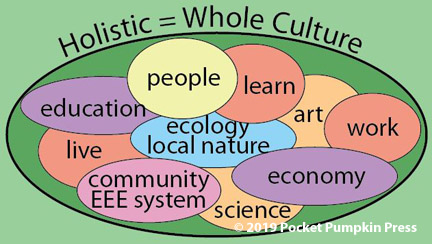
Holistic means Whole Culture.
I use the word "holistic"
not to narrowly mean herbal medicines alone,
but yes to broadly mean whole culture, including economy, education, science, art, the ways we live and learn and work, relationships with people, relationships with nature, etc.
Read more about holistic.

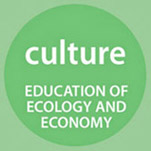
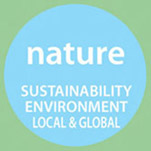
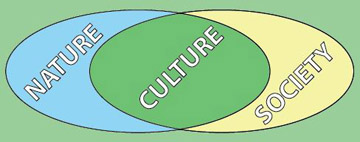
Culture is society's
relationship with nature.
Culture includes how society uses nature (air, water,
soil, habitats, etc.), views nature, values nature, learns about nature, and takes care of nature.
Culture includes how nature links to and is viewed
in the media,
schools, education, health care, economy,
morals, ethics, government, science, art, language, etc.
Read more about culture and nature-culture.
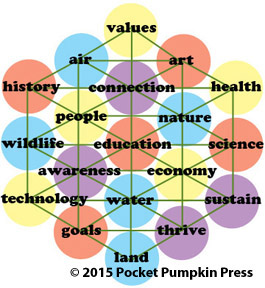
Everything is Connected to Everything Else.
All social, cultural, economic, and environmental aspects are interrelated to each other. All social and cultural features (health, economy, education, science, art, government, etc.) relate to each other as well as to all natural features (air, water, soil, land, weather, plants, animals, small habitats, large ecosystems, etc.).
Read more at connect.
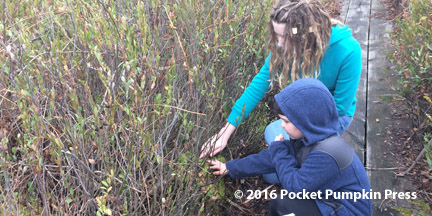
1 Solution of Many Connections:
An Education that will
boost wellness + reduce problems
boost many aspects of well-being:
Boost goodness, morals, awareness, love, health, safety, joy, fun, peace, education, economy, nature, quality of life, good governing, and more.
diminish global chronic problems:
Diminish poverty, community dysfunction, greed, complacency, rush, daily grind, depression, violence, lousy education, increasing climate change, pollution, wilderness loss, and more.
Read more at one solution.

Morals and 5 Ways to be Nice.
We implement the ABC Holistic Education Garden to teach children how to be moral: to do good, sustainable, and holistic things for communities, people, and nature. Also, garden lessons include learning how to be nice in 5 ways. It's important for each person to be nice in all 5 ways.
1. Friendly to People
2. Unprejudiced
3. Friendly to Nature
4. Help Individuals in Occasional Emergencies Help Individuals (people, animals, plants, etc.), Random Acts of Kindness, Save a Life, etc.
5. Daily Community Help, Holistically Help Communities via Community Culture. Boost quality of life. Sustain and enrich the community. Improve the economy in the long-run. Diminish poverty.
Read more about Morals and 5 Ways to be Nice.
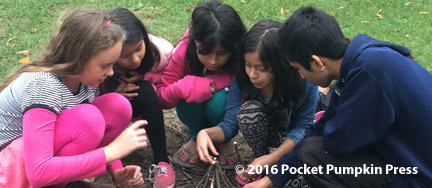
Community and Government.
A community, a functional and sustainable community, is much more than just people, buildings, and roads existing geographically near to each other. A functional community includes a community government that sustainably guides the community culture, education, ecology, economy, and health. A functional community is largely locally-self-sufficient. A functional community has community cooperation: people work together with each other and local nature to produce all the stuff (shelter, water, food, clothes, tools, art) that they need by using mostly local resources, and sustaining the resources. Community residents live, learn, work, socialize, produce, consume, and recycle and dispose of waste, within the community. They travel too and exchange information with the world; but, they mostly live, learn, and work within the community, and mostly consume local products. Think Global, Act Local.
Read more about community.
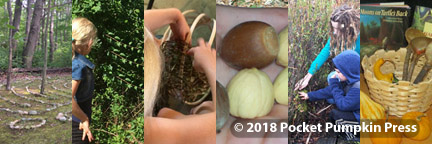
Holistic Community Education.
(a.k.a. Holistic Education or Community Education)
(a.k.a. 18 Multiple Intelligences)
The wisest education is a holistic sustainable community education to learn (study and experience) how to live, learn, and work to help communities, people, and nature, by doing the following 18 holistic education skills and subjects. In holistic education, every subject is interdisciplinary. Each subject relates to the other holistic subjects, to academic subjects, as well as to local and global issues.
Read more about holistic community education.

"Eco:" Ecology and Economy unite.
"eco" is the root word of both ecology and economy. "eco" means home, in the Greek language.
Ecology is learning about your home in nature.
Economy is taking care of your home in nature. An economy is people having stuff (shelter, water, food, clothes, soap, tools, art, etc.), how people get their stuff, and how people take care of nature as they get materials from nature and make their stuff.
Read more about eco: ecology and economy.
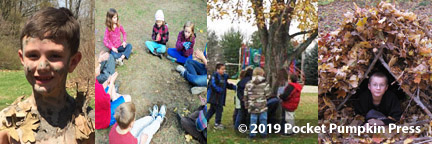
CEEE:
Culture, Education, Ecology, Economy
Sustainability is mostly about our culture, education, ecology, and the economy. Sustainability and diminishing poverty is not just about technology and money. There is no purely technological and or financial fix. Technology and money can help. But, mostly, sustainability and diminishing poverty are achieved through our culture, education, ecology, and the economy. If we want to change to live a more sustainable life, then we must change our culture, education, ecology, and economy in unison. Culture, education, ecology, and economy all need to have the same top goal: to help to sustain and enrich communities, people, and nature more so than just boosting people's income, increasing the nation's Gross National Product (GNP) or Gross Domestic Product (GDP), getting higher scores in state testing, and or advancing technology.
Read more about CEEE (culture, education, ecology, economy).

Holistic Sustainability.
being environmental
including 40 Sustainable Categories
Let's sustain and enrich communities, people, and nature. Let's have an education that teaches students how to run sustainable communities and an economy that are mutually beneficial to both people and nature.
Sustainability includes recycling, reusable bags, shopping local, organic food, and renewable energies. Yet, sustainability deals with more than food, money, energy, and technology. Sustainability also deals with communities, culture, nature, the outdoors, education, community economics, morals (connection and helping others: both people and nature), a mix of self-sufficiency and community cooperation, science, art, creativity, being holistic, and more.
1. Peace: Morals-Love-Awareness-Health-Safety
2. Pursuits: You, Your Unselfish Self
3. Planet: Nature, Near and Far, Big and Small
4. People: Family, Friends, etc.
5. Palleee: Functional Community
6. Probing: Community Education
7. Parks and Pastures: Local Ecology
8. No-Poverty: Plush Local Economies
9. Plait: Holistic: Sci-Art-Eco-Eco
10. Protection: Sustainability
11. Plaza: Education Space: ABC Garden
12. Play and Fun: Outdoor Time
17. Eco: Ecology-Economy
18. Land: Holistic Landcare
23. Low-Tech: Sustainable Technology
24. High-Tech: Sustainable Technology
28. Local: Shopping, Food, Working, etc.
29. Food: Local, Organic, non-GMO, Crop Diversity,
Family Farms, Community Co-op Farms,
Permaculture, Managed Grazing, No-Till Farming, etc.
30. Energy: Fuel, Electric Power, Renewable Energy, etc.
31. Clubs: Environmental
32. Climate: Mitigate Change
33.
Muck: Litter, Garbage, Pollution
34.
Elements: Air, Water, Soil
35. RRR: Reduce, Reuse, Recycle
36. Design: and Land Management
37. Wilderness: Conservation
Read more about holistic sustainability.

10 Goals and Success Indicators of education, ecology, and economy and other agencies in GREEEPCH, in order to help communities, people, and nature.
1. Peace: Morals, Ethics, Neighborly Love:
Morals-Love-Awareness-Health-Safety
A peaceful and moral society, community, agency, and person are good by being loving and caring for communities, people, and nature.
To lovingly care for communities, people, and nature, a society, community, agency, and people must be aware of communities, people, and nature and their needs for health and safety.
2. Protection: Sustainability.
Understand Sustainability.
We want to sustain people.
Yet in order to sustain people,
we must also
sustain nature, a favorable climate, local ecologies,
palleee: functional local communities with their EEE systems, local economies, community education,
and the 40 Sustainability Categories.
Plus, various agencies must have the same top 10 goals which are the "10 joint goals."
3. Plaza: Education Space: ABC Garden.
At the ABC Garden, students learn the ABCs of community education, running a community, working on the 40 Sustainability Categories, and working on the other 9 Joint Goals of GREEEPCH.
4. Play and Fun: Outdoor Time.
5. No-Poverty: Plush Local Economies.
6. Palleee: Functional Community with EEE System.
7. Probing: Community Education.
8. Parks and Pastures: Local Ecology,
Community Landscape, Local Nature, Farmland.
9. Plait: Holistic: Sci-Art-Eco-Eco,
Science, Art, Ecology, Economy Link Together.
10. Energy.
Read Details of 10 joint goals of GREEEPCH.
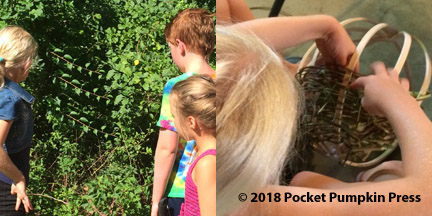
Science and Art unite.
Science includes observation, questions, research, knowledge, experiment, and learning the patterns of nature and how nature works, etc.
Science is what we "take in" (observe, learn).
Art is what we "give out" (expression, work).
Art includes expression, creativity, working, and applying science to make things of pleasing form and function. Science is the knowledge and theory. Art is the action, creativity, and making something. Science and art are connected. Art is the putting the theory of science into action to make something. Doing art (making something) requires science (knowing how to make something).
In general: the science is the finding of patterns in nature and how nature works; the art is using the science learned to creatively make something.
For example, see above photo: science includes learning about the bittersweet vine; the art includes making the bittersweet vine into a basket.
Read more about science and art.
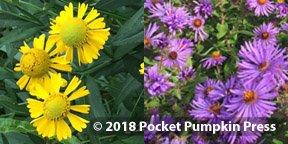
Holistic Health.
The ABC Garden supports all 7 types of health:
moral, mental, physical, social (community), economic (having enough supplies), environmental, and healing and disease treatment.
Read more about it at health.
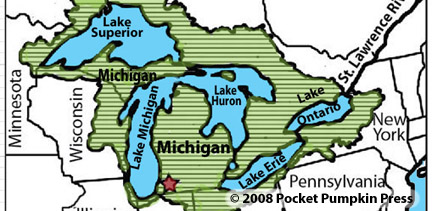
Maps
Maps of Three Oaks, Michigan,
Galien River Watershed, Berrien County, Michigan, Great Lakes Watershed, USA, World, etc. Maps.
See Maps.

Tools and Technology.
primitive low-tech to modern high-tech
ABCs of tools: Start Simple;
later, gradually get more Complex.
Read more about it at tools.
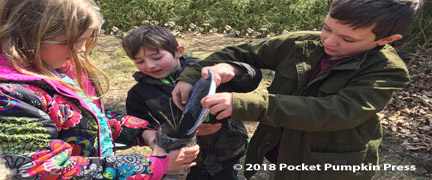
Peace.
The ABC Garden is a Peace Garden. The ABC Garden doesn't just symbolize peace or honor peace, but it promotes and spreads peace. Learning community skills boosts peace.
Read more about it at Peace, Health, Harmony.

Famous Quotes, with Photos
Here are some quotes that support the concepts of an ABC Garden. Plus, photos of Michigan nature.
Read the Quotes.
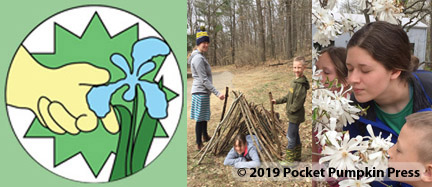
Galien Valley Nature and Culture Program (GV-NCP).
Galien Valley Nature and Culture Program runs interdisicplinary classes about nature and culture. Classes are informative and fun. Students learn how culture and nature relate to each other and how science, art, health, economy, etc. relate to nature too. Furthermore, classes include a few lessons on holistic skills as well as the ABCs of community, ecology, economy, science, art, and more.
See Galien Valley Nature and Culture Program website at www.z-hub.org/galienvalleyncp.html
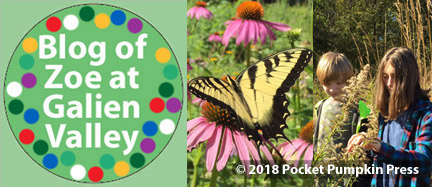
Blog of Zoe at Galien Valley, about practicing holistic skills, science, art, teaching nature classes and the ABCs of 6 holistic skills, local wildlife, local native flowers, stewardship and landcare of local habitats, etc.
●See Zoe's Daily Blog website at
www.z-hub.org/zle-blog.html
●See Zoe's Monthly Blog website at
zoemonthlyblog.blogspot.com
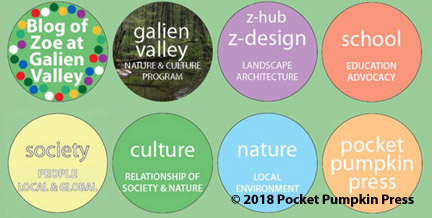
z-hub homepage. See more information about every basic thing that is important to the well-being of people - and how everything links to everything else. See www.z-hub.org










































